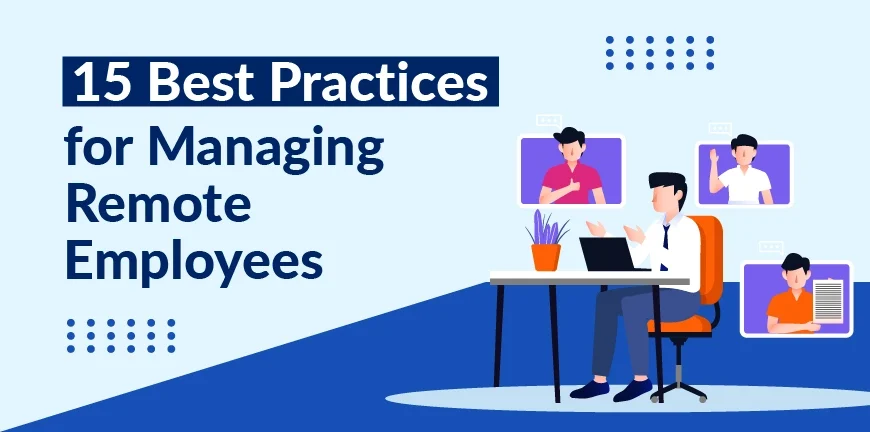
Offshore RPO: Benefits, Insights, and Best Practices
30/12/2024
12 Effective BPO Recruitment Strategies for Smarter Hiring in 2026
02/01/2025Remote work can quickly become a gloomy ordeal, especially if the work is underappreciated or overwhelming. Remote employees need to be as well-managed as their regular-to-office counterparts and feel as much included in the workplace.
If a proper cultural fit is not ensured, then remote employees can get bogged down at work. In this article, we look at the best practices that could be the difference between an engaged and a disengaged remote employee. We hope these 15 best practices for managing remote employees help ensure greater productivity at work.
Best Practices for Managing Remote Employees
1. Set the Right Expectations
It is important to set the right expectations for remote workers and have them exceed those only if they want to. Be it the working hours or the attire that is to be worn in a meeting, everything must be communicated in advance.
2. Maintain a Policy for Remote Hiring
Before you hire your remote workers, you must have a clear and well-defined policy that states what demographic they would be hired from, what basic skills they must possess, and how diverse you want the team to be.
3. Manage Remote Employees Using a Specific Framework
Remote workers must be managed under a specific set of rules that relate to the work they do, there must be limits on overtime and any disciplinary action, if necessary, against anyone must be well thought out.
4. Encourage Remote Employees to Socialize
Remote workers must be encouraged to socialize with others in the team, and this starts with making them feel included and wanted at the workplace. Encourage them to collaborate and co-create with their team members.
5. Do Not Have Rotating Shifts for the Same Employee
No employee must be made to work rotating shifts. This can significantly impact how they view your business and affect your reputation in the long term. See how best you can allocate resources to make sure this doesn’t happen.
6. Use Effective and Clear Communication
Effective and clear communication is very important to ensure that your remote employees are aware of their responsibilities and rights. This also ensures that work happens in a timely manner, and they can collaborate more easily.
7. Ensure Timely and Accurate Payroll
Maintaining timeliness and accuracy in payroll helps ensure that your remote employees are happy and productive. They will also gladly take on any additional responsibilities that may be communicated to them later.
8. Give Ample Time to Recharge and Return to Work
Remote employees, just like your regular employees, need time away from work. Sometimes work from home can get hectic. Allow remote employees to take time away from work to recharge and return to work.
9. Maintain a Healthy Employee-Manager Relationship
Remote employees are as much a part of your team as are your office-going staff. To maintain a healthy employee-manager relationship, you must ensure that they communicate with each other without any barriers.
10. Have an Open Door Policy
You may have remote employees too who are disgruntled. To accommodate their requests and concerns, you must have an open-door policy, which encourages them to come to you without any hesitation or fear of disregard or alienation.
11. Maintain Inclusivity in Everything You Do
Start by making sure you involve your remote employees too to as much possible an extent in office activities. Make sure that you get the feedback of your remote employees in surveys too.
12. Use Tools to Facilitate Remote Work
Use tools to collaborate with remote employees. Make sure that your remote employees are also aware of how to use these tools. If necessary, train your employees in how to use them, and increase their productivity while doing so.
13. Manage, But Do Not Micromanage Employees
Micromanaging remote employees can cause them to abandon responsibilities at work, because they find it too difficult to take them on under pressure of performance. Measure their work, but do not micromanage.
14. Celebrate Achievements at and Outside of Work
Your remote employees bring a unique perspective of life outside of work in addition to giving their best at work. Respect their out-of-office achievements as much as achievements at work.
15. Encourage Professional and Personal Development
Though recruited initially for the niche skills they possess, remote employees need to advance professionally too. Make sure that you encourage them to participate in learning and development initiatives and focus on personal development and mental health and well-being.
Are You Looking for a Remote Staffing Partner?
Despite the best practices we have suggested, it is very likely that you will encounter challenges when you are managing remote employees. The biggest challenge is the hiring process itself. How do you ensure you have the best remote employees?
Alp Consulting, a recruitment and staffing company based in Bangalore, has over two decades of experience hiring remote teams for many Fortune 500 companies and now wants to hire remote staff for your business. Talk to us, so we can discuss your requirements.
FAQs
1. What are the best practices for managing remote employees?
Before you hire a remote employee, make sure you have a proper remote work policy in place, the right expectations are set, the right communications are sent and that the rules and regulations in the workplace are well explained.
2. What tools are essential for remote team management?
For proper remote team management, you must use communication and collaboration tools like Slack, Skype etc. Tools like Canva can also be used for collaboration in a remote work environment, especially for creative and marketing teams.
3. What communication methods work best for remote teams?
Email is recommended when you need to notify many people who are working remotely. WhatsApp is more apt if you want to remind people of an event or meeting. And you need to call and speak to the person if you want to communicate something urgent, as well as put it in mail.
4. What are the benefits of managing a remote team effectively?
There are many benefits to managing a remote team effectively. Your remote employees, especially those from different cultures and nations, bring with them a lot of different ideas and possibly innovations that could help. It also helps boost your reputation.
5. What strategies help build trust with remote employees?
To build trust with remote employees, practice transparency in pay structures and policies. Document everything right from the use of the employee self-service portal to whistleblower policies if any.
Contact Us For Business Enquiry

Roshan Suresh
Roshan Suresh is the Vice President at ALP Consulting with over 17 years of experience in technology and leadership hiring. He specializes in full-time recruitment for IT products, e-commerce, services, and BFSI sectors, driving end-to-end hiring strategies for top enterprise clients. With a strong foundation in R&D and technical recruitment, Roshan has built high-performing teams that deliver exceptional talent solutions across India.




